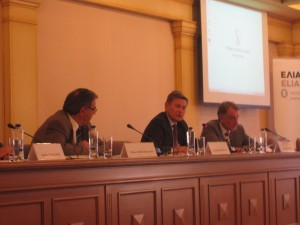 There is a lively debate in academic and political circles as to the lessons drawn from the current financial crisis and the remedies required for a future one to be prevented. In its interest in this highly significant topic the Hellenic Foundation for European and Foreign Policy organised a lecture by Professor Leszek Balcerowicz (Economist, former Deputy Prime Minister and Minister of Finance of Poland, former President of the National Bank of Poland and Chairman of the BRUEGEL – think tank) with the participation of Nikos Christodoulakis (Professor at the Athens University of Economics and Business and former Minister of Economy and Finance for Greece) as a commentator and Loukas Tsoukalis (Professor at the University of Athens and President of ELIAMEP) as a moderator.
There is a lively debate in academic and political circles as to the lessons drawn from the current financial crisis and the remedies required for a future one to be prevented. In its interest in this highly significant topic the Hellenic Foundation for European and Foreign Policy organised a lecture by Professor Leszek Balcerowicz (Economist, former Deputy Prime Minister and Minister of Finance of Poland, former President of the National Bank of Poland and Chairman of the BRUEGEL – think tank) with the participation of Nikos Christodoulakis (Professor at the Athens University of Economics and Business and former Minister of Economy and Finance for Greece) as a commentator and Loukas Tsoukalis (Professor at the University of Athens and President of ELIAMEP) as a moderator.
The event took place Thursday, September 23, 2010, 12:30 p.m., at the Head Office of the Bank of Greece.
According to Professor Balcerowicz there is no good alternative for capitalism. Further to this, symptoms of the global financial crisis should not be confused with causes while the argument that we have witnessed a pure market failure can be possibly challenged. As he explained, analytically-based lessons from the present crisis should focus on revisions of the macroeconomic and regulatory frameworks for financial markets that will reduce the risks of dangerous booms and busts. In his view, however, ‘a lot of work remains to be done’, as there is currently no ‘consistent package’, although the Basel reforms can be regarded as a positive step. Professor Balcerowicz, finally, championed the decision of Poland to keep its national currency as a shield to be less vulnerable in the crisis and partly attributed the current problems of the eurozone to the lack of political integration in the European Union.
For his part, Professor Christodoulakis argued that it is ‘hard to prevent the unknown’ and concentrated on the need for future real imbalances and private failures to be avoided. He suggested that a good growth path has to be found and more efforts should be devoted towards this direction in the long term. Commenting on the relative success of Poland, however, Professor Christodoulakis did not largely insist on its absence from the eurozone but mainly on its successful policy of reforms.
As for Professor Tsoukalis he put three issues on the table, providing more ‘food for thought’. The first was how entrepreneurial capitalism can be weakened from within from the moment markets are imperfect. The second was whether the global financial crisis is definitely over. And the third was that politics has to immediately deliver and cannot wait for the results of academic research to be reached.
See Mr Balcerowicz’ s CV here.



